-
REVIEW05-03-2024
Elements of fatherhood involved in the gestational period: a scoping review
Revista Brasileira de Enfermagem. 2024;77(1):e20230029
Abstract
REVIEWElements of fatherhood involved in the gestational period: a scoping review
Revista Brasileira de Enfermagem. 2024;77(1):e20230029
DOI 10.1590/0034-7167-2023-0029
Views0See moreABSTRACT
Objective:
To identify in the literature and summarize the elements and characteristics of fatherhood involved during pregnancy.
Method:
Scoping review that used PRISMA-ScR guide to report this review. Searches were carried out in PubMed, CINAHL, PsycInfo, LILACS and Scopus. Google search engines and public health agency websites assisted in searches of gray literature and Rayyan in screening studies.
Results:
A total of 406 articles were identified, of which 16 made up the final sample. Five elements make up an involved fatherhood: feeling like a father, being a provider and protector, being a partner and participant in pregnancy, participating in prenatal appointments and feeling prepared to take care of a baby.
Conclusion:
Fathers want to be involved in prenatal care, but feel excluded from this process. Public policies that encourage paternal involvement and healthcare professional training to better welcome and promote paternal involvement are of paramount importance.
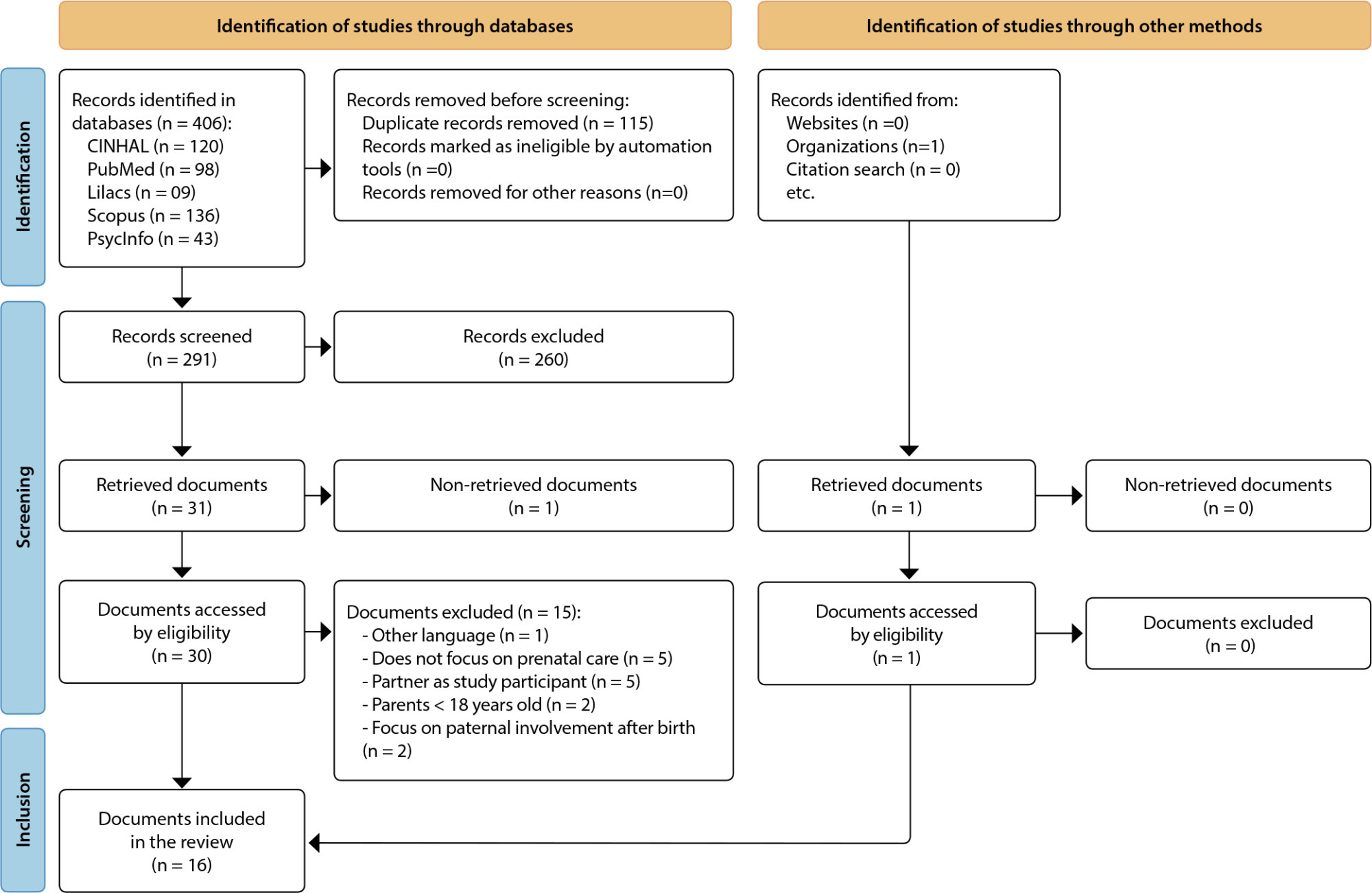
-
ORIGINAL ARTICLE05-03-2024
Josicélia Dumêt Fernandes’ professional trajectory: contributions to psychiatric and mental health nursing
Revista Brasileira de Enfermagem. 2024;77(1):e20230174
Abstract
ORIGINAL ARTICLEJosicélia Dumêt Fernandes’ professional trajectory: contributions to psychiatric and mental health nursing
Revista Brasileira de Enfermagem. 2024;77(1):e20230174
DOI 10.1590/0034-7167-2023-0174
Views0See moreABSTRACT
Objectives:
to analyze nurse Josicélia Dumêt Fernandes’ life story, with emphasis on her work in the psychiatry and mental health fields.
Methods:
historical, qualitative research. Semi-structured interviews and documentary research were used as data collection techniques, collected from September to October 2021. For data analysis, we opted for the content analysis method and comparison with the Foucauldian philosophical framework.
Results:
four categories emerged: Transforming herself and mental health practices; (Re)framing professional practice; Nursing practice and power relations; and The paths and implications in the psychiatry and mental health fields.
Final Considerations:
the study of the biographer demonstrates a search for transformation of herself and mental health practices, with a rupture in paradigms and reframing of her practice in psychiatry and mental health.
-
ORIGINAL ARTICLE05-03-2024
Psychometric properties of the Chilean version of the quality of life questionnaire for multiple myeloma
Revista Brasileira de Enfermagem. 2024;77(1):e20230100
Abstract
ORIGINAL ARTICLEPsychometric properties of the Chilean version of the quality of life questionnaire for multiple myeloma
Revista Brasileira de Enfermagem. 2024;77(1):e20230100
DOI 10.1590/0034-7167-2023-0100
Views0See moreABSTRACT
Objectives:
To evaluate the internal consistency and construct validity of the QLQ-MY20 for assessing the quality of life in multiple myeloma survivors in Chile.
Methods:
This was a cross-sectional study conducted between March 2020 and December 2022. It involved 118 individuals from two public hospitals. The QLQ-C30 and QLQ-MY20 questionnaires were used. Internal consistency was assessed using Cronbach’s alpha(α), and construct validity was evaluated through hypothesis testing (Mann-Whitney and Spearman correlation).
Results:
The average age of participants was 67.2 years (SD=9.2). Internal consistency for the complete scale was α=0.779, for the “disease symptoms” dimension α=0.671, for the “side effects of treatments” dimension α=0.538, and for the “future perspective” dimension α=0.670. Four of the five construct validity hypotheses were confirmed: women, individuals with worse performance status, those with pain, and those with worse fatigue showed more symptoms.
Conclusions:
The Chilean version of the QLQ-MY20 demonstrates adequate internal consistency and construct validity.
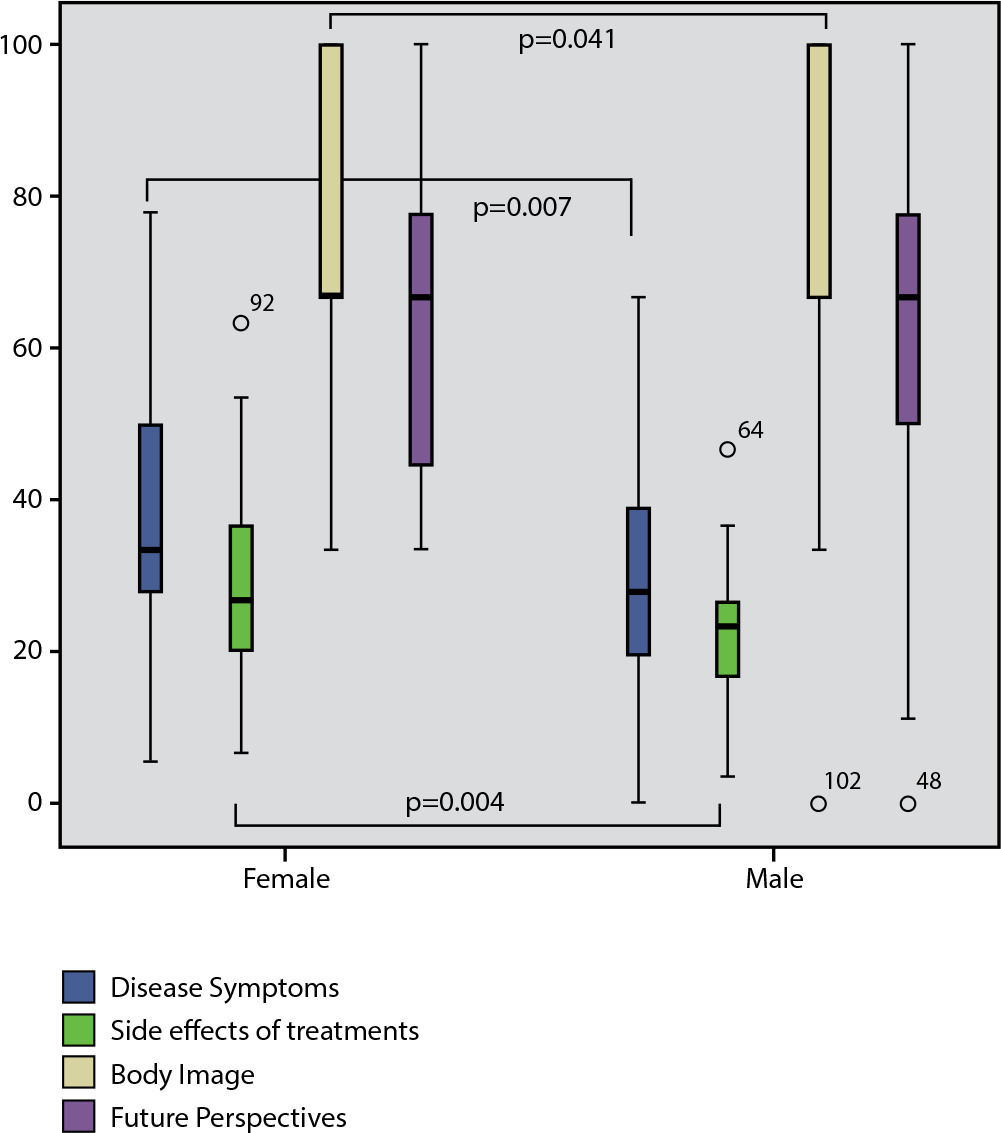
-
ORIGINAL ARTICLE05-03-2024
Pregnancy loss in women with systemic lupus erythematosus: Grounded Theory
Revista Brasileira de Enfermagem. 2024;77(1):e20230225
Abstract
ORIGINAL ARTICLEPregnancy loss in women with systemic lupus erythematosus: Grounded Theory
Revista Brasileira de Enfermagem. 2024;77(1):e20230225
DOI 10.1590/0034-7167-2023-0225
Views0See moreABSTRACT
Objective:
to learn the meanings attributed to pregnancy loss by women with Lupus.
Method:
qualitative research, based on Symbolic Interactionism and Grounded Theory. Data collection took place between January and August 2022 through in-depth interviews. Data analysis went through the stages of initial and focused coding.
Results:
seventeen women participated. The central phenomenon “The climb to motherhood: falls and overcoming” was constructed, consisting of three categories: “Falling to the ground during the climb: the experience of pregnancy loss”; “Getting up and following the path: new attempts to conceive”; and “Remembering the journey: meanings attributed to pregnancy losses”.
Final considerations:
experiencing pregnancy is, analogously, like climbing a mountain, where obstacles need to be overcome to reach the summit. The experience of pregnancy loss is seen as complex, especially when there is fragility in healthcare and a lack of awareness regarding feelings of loss and grief.
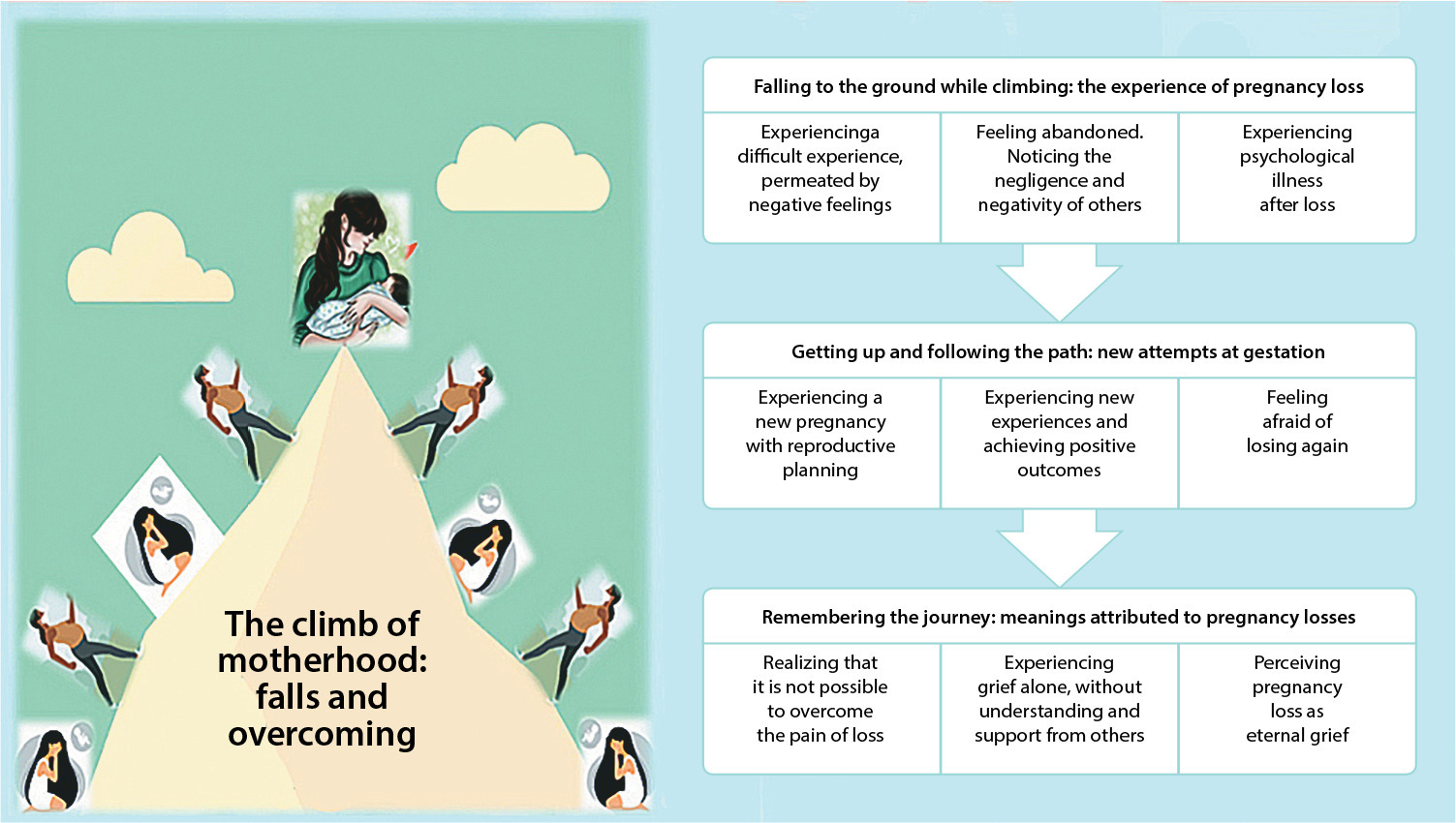
-
05-03-2024
Preditores de volume excessivo de líquidos em pacientes em hemodiálise: estudo observacional
Revista Brasileira de Enfermagem. 2024;77(1):e20220816
Abstract
Preditores de volume excessivo de líquidos em pacientes em hemodiálise: estudo observacional
Revista Brasileira de Enfermagem. 2024;77(1):e20220816
DOI 10.1590/0034-7167-2022-0816
Views0See moreRESUMEN
Objetivos:
evaluar los factores de riesgo del exceso de volumen de líquido en pacientes en hemodiálisis.
Métodos:
estudio retrospectivo de casos y controles. Se incluyeron 392 pacientes (196 casos y 196 controles) de dos centros de hemodiálisis. Se evaluaron datos sociodemográficos y 23 factores de riesgo de exceso de volumen de líquido mediante un formulario de recolección de datos. Los datos se analizaron mediante un modelo de regresión logística multivariado.
Resultados:
factores de riesgo conocimiento insuficiente (OR=2,06), ingesta excesiva de líquidos (OR=2,33), retirada inadecuada de líquidos durante la hemodiálisis (OR=2,62) e ingesta excesiva de sodio (OR=1,91) pueden aumentar aproximadamente dos veces la posibilidad de que se produzca un exceso de volumen de líquido en pacientes en hemodiálisis. La educación (OR=0,95) y la edad (OR=0,97) son factores protectores del volumen excesivo de líquido.
Conclusiones:
conocer estos factores de riesgo puede ayudar a las enfermeras a realizar una inferencia diagnóstica precisa y rápida del riesgo de volumen excesivo de líquidos.
-
REVIEW05-03-2024
Nursing interventions to empower the family caregiver of person with lower limb amputation: scoping review
Revista Brasileira de Enfermagem. 2024;77(1):e20230264
Abstract
REVIEWNursing interventions to empower the family caregiver of person with lower limb amputation: scoping review
Revista Brasileira de Enfermagem. 2024;77(1):e20230264
DOI 10.1590/0034-7167-2023-0264
Views0See moreABSTRACT
Objectives:
to map nursing interventions that empower the Family caregiver of the person with lower limb amputation for is role.
Methods:
scoping review guided by Joanna Briggs Institute methodology conducted in different databases (including gray literature).
Results:
six studies published between 2009 and 2021 were included. Interventions of counselling and support for patients and family; peer support interventions performed by a certified pair; involvement of caregivers or family members in support groups; and key interventions for patient and family caregiver psychological balance. Two studies discussed the importance of caregiver and amputee training and development of coping skills. Another study recommended Interventions of informative support for caregivers regarding care for the amputee and adaptation to home.
Conclusions:
results of this review allow the identification of recommendations (guidelines) for practice and recommendations/suggestions for interventions according with identified needs of family caregivers of patients with lower limb amputation.
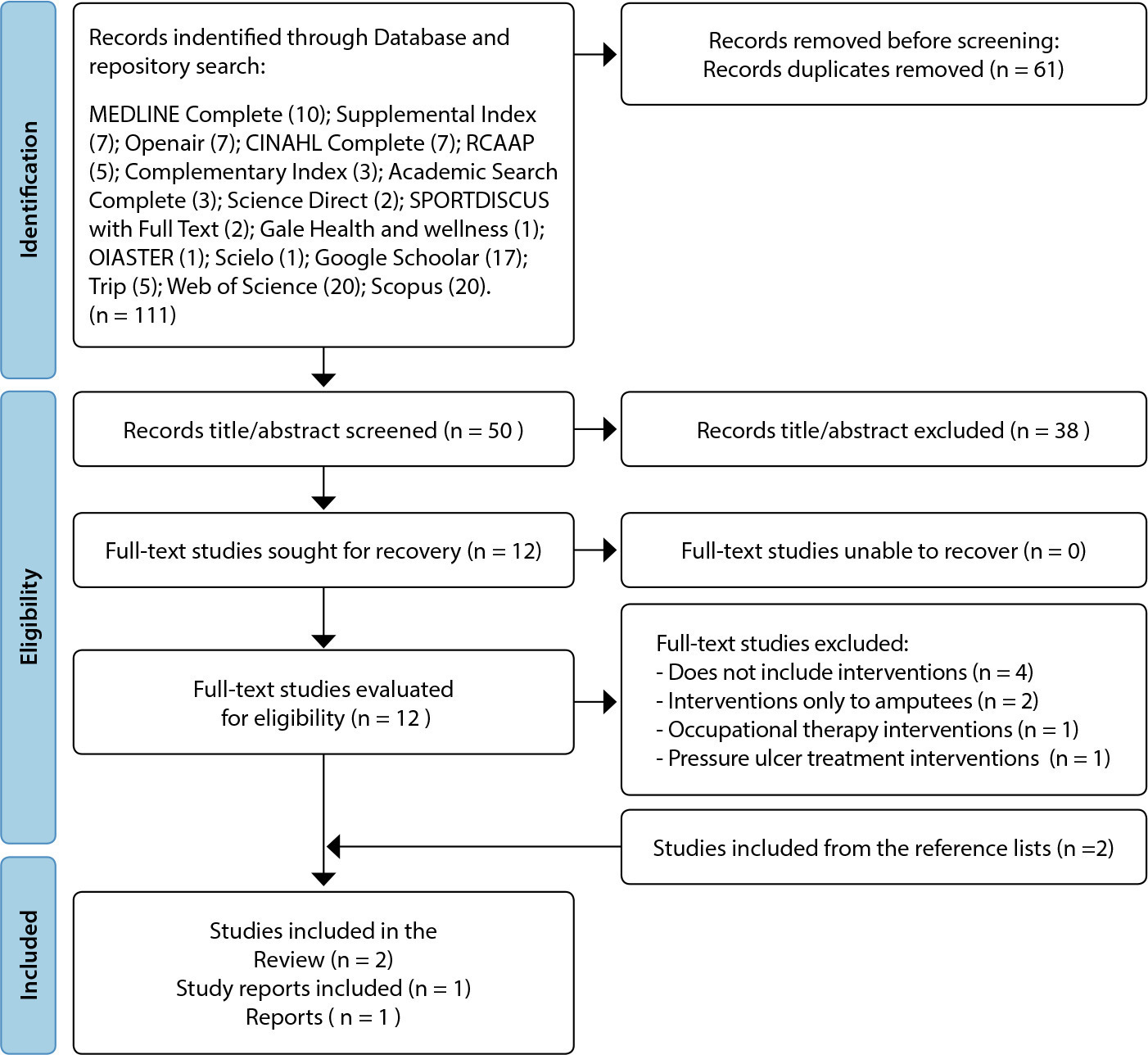
-
05-03-2024
Intervenções de Enfermagem para capacitar o cuidador familiar de uma pessoa com amputação de membro inferior: revisão de escopo
Revista Brasileira de Enfermagem. 2024;77(1):e20230264
Abstract
Intervenções de Enfermagem para capacitar o cuidador familiar de uma pessoa com amputação de membro inferior: revisão de escopo
Revista Brasileira de Enfermagem. 2024;77(1):e20230264
DOI 10.1590/0034-7167-2023-0264
Views0See moreRESUMEN
Objetivos:
mapear intervenciones de enfermería que capaciten al cuidador familiar de la persona con amputación de miembro inferior para su rol.
Métodos:
es una revisión de alcance guiada por la metodología del Instituto Joanna Briggs, llevada a cabo en diferentes bases de datos (incluyendo literatura gris).
Resultados:
se tuvieron en cuenta seis estudios publicados entre 2009 y 2021, a saber: intervenciones de asesoramiento y apoyo para pacientes y familiares; intervenciones de apoyo entre iguales realizadas por un par de profesionales certificados; participación de cuidadores o familiares en grupos de apoyo e intervenciones clave para el equilibrio psicológico del paciente y del cuidador familiar. Dos estudios analizaron la importancia de la formación del cuidador y del amputado y del desarrollo de habilidades de afrontamiento. Otro estudio recomendó intervenciones de apoyo informativo para los cuidadores en relación con el cuidado del amputado y su adaptación a la vida hogareña.
Conclusiones:
los resultados de esta revisión permiten identificar recomendaciones/directrices para la práctica y recomendaciones/sugerencias de intervenciones según las necesidades identificadas de los cuidadores familiares de pacientes con amputación de miembros inferiores.
-
05-03-2024
Propiedades psicométricas de la versión chilena del cuestionario de calidad de vida para mieloma múltiple
Revista Brasileira de Enfermagem. 2024;77(1):e20230100
Abstract
Propiedades psicométricas de la versión chilena del cuestionario de calidad de vida para mieloma múltiple
Revista Brasileira de Enfermagem. 2024;77(1):e20230100
DOI 10.1590/0034-7167-2023-0100es
Views0See moreRESUMEN
Objetivos:
Evaluar consistencia interna y validez de constructo del QLQ-MY20 para valoración de calidad de vida en sobrevivientes de mieloma múltiple en Chile.
Métodos:
Estudio transversal, realizado entre marzo 2020 y diciembre 2022. Participaron 118 personas de dos hospitales públicos. Se utilizaron los cuestionarios QLQ-C30 y QLQ-MY20. Fueron evaluadas la consistencia interna con alfa de Cronbach (α) y validez de constructo mediante pruebas de hipótesis (Mann Whitney y correlación de Spearman).
Resultados:
El promedio de edad de los participantes era 67,2 (DE=9,2) años. Consistencia interna para escala completa (α=0,779), dimensión “síntomas de la enfermedad” (α=0,671), dimensión “efectos secundarios de los tratamientos” (α=0,538) y dimensión “perspectiva de futuro” (α=0,670). Se comprobaron cuatro de las cinco hipótesis de la validez de constructo: presentaron más síntomas las mujeres, personas con peor performance estatus, con dolor y con peor fatiga.
Conclusiones:
La versión chilena del QLQ-MY20 presenta adecuada consistencia interna y validez de constructo.
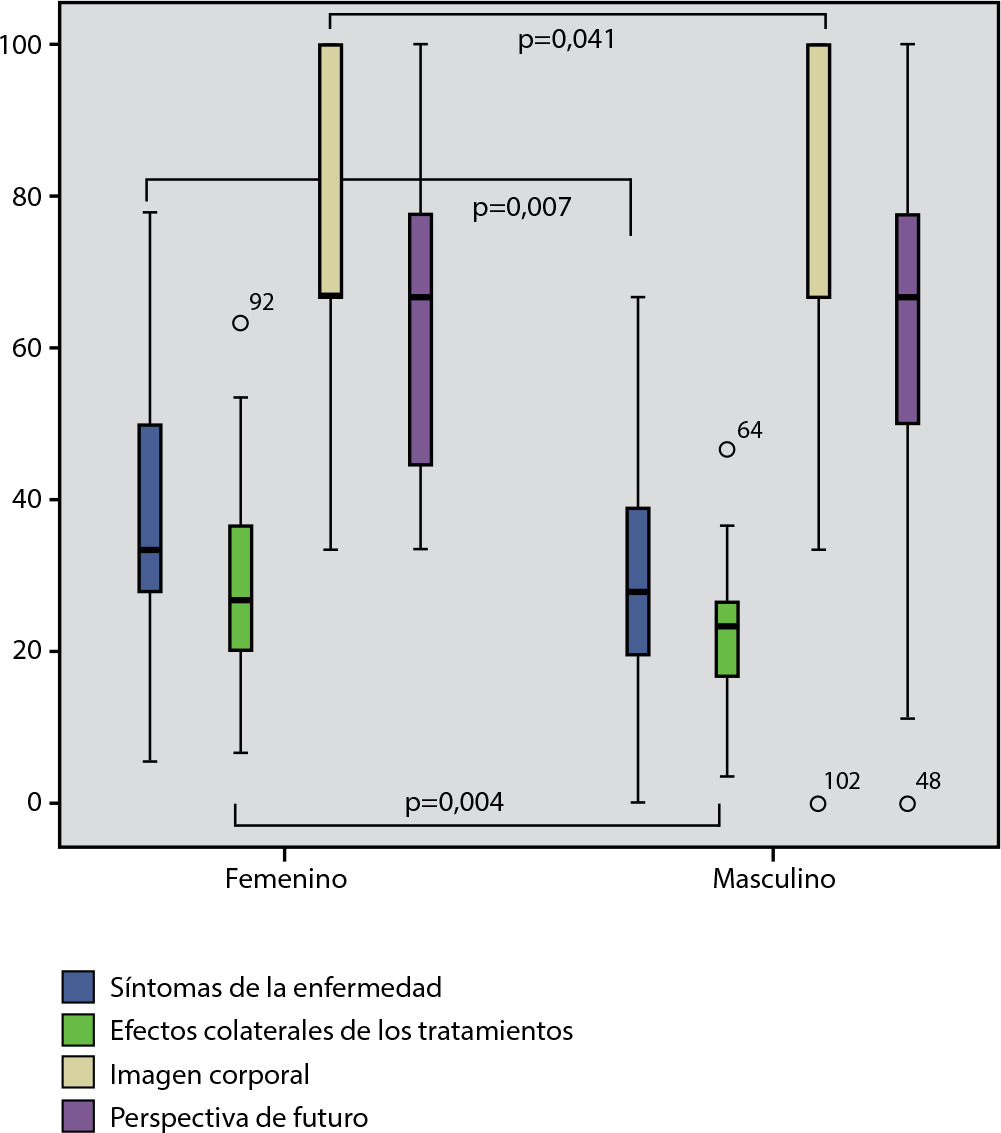
-
ORIGINAL ARTICLE12-04-2023
Burnout, ethical climate and work organization in covid-19 intensive care units: mixed method study
Revista Brasileira de Enfermagem. 2023;76:e20220684
Abstract
ORIGINAL ARTICLEBurnout, ethical climate and work organization in covid-19 intensive care units: mixed method study
Revista Brasileira de Enfermagem. 2023;76:e20220684
DOI 10.1590/0034-7167-2022-0684
Views0See moreABSTRACT
Objectives:
to analyze the association between burnout and the perception of the ethical climate in nursing professionals in the covid-19 Intensive Care Unit and the relationship with the organization of work from the perspective of managers of these units.
Methods:
mixed method study conducted in three university hospitals in southern Brazil from December 2021 to March 2022. A cross-sectional study was developed with 110 nursing professionals, followed by an exploratory-descriptive study through semi-structured interviews with six managers. Descriptive and analytical statistics and discursive textual analysis were used.
Results:
the prevalence of burnout was 10% and the perception of negative ethical climate was 24.5%. The association between burnout and ethical climate revealed overload and fatigue during working hours, related to tension, fear, and stress that emerged from the consequences of the organization and relations of work in the covid-19 Intensive Care Unit.
Conclusions:
there was an association between burnout and ethical climate and elements of the work organization.
-
ERRATUM02-26-2024
ERRATUM
Revista Brasileira de Enfermagem. 2024;77(1):e20160061
Abstract
ERRATUMERRATUM
Revista Brasileira de Enfermagem. 2024;77(1):e20160061
DOI 10.1590/0034-7167.20247701e03
Views2In the article “Nurses in the labor market: professional insertion, competencies and skills”, with DOI number: , published in Revista Brasileira de Enfermagem, 2017;70(6):1220-6, on page 1225:Include before REFERENCES:[…]See more -
ERRATUM06-14-2024
ERRATUM
Revista Brasileira de Enfermagem. 2024;77(2):e2024n2e06
Abstract
ERRATUMERRATUM
Revista Brasileira de Enfermagem. 2024;77(2):e2024n2e06
DOI 10.1590/0034-7167.20247702e06
Views2In the article “Is there scientific relevance to the plot of films and documentaries about eating disorders?”, with DOI number: , published in Revista Brasileira de Enfermagem, 2024;77(1):e20220547, page 7:Where it read:[…]See more -
ORIGINAL ARTICLE07-29-2024
Educational technology for multidisciplinary training for managing waiting lists for elective patients
Revista Brasileira de Enfermagem. 2024;77(3):e20230299
Abstract
ORIGINAL ARTICLEEducational technology for multidisciplinary training for managing waiting lists for elective patients
Revista Brasileira de Enfermagem. 2024;77(3):e20230299
DOI 10.1590/0034-7167-2023-0299
Views1See moreABSTRACT
Objectives:
to construct and assess an educational technology for managing patient waiting lists for multidisciplinary training.
Methods:
study supported by Instructional Design – ADDIE model, whose stages of construction of educational technology were developed in the form of a multi-professional training course. Its respective content assessment was carried out by a committee of experts from 2021 to 2022. The analysis occurred based on the proportion of content adequacy with 95% Confidence Interval.
Results:
seventeen products were created as educational technology learning objects: five storyboards; four videos; three comic books; two pedagogical action plans; a mind map; and a YouTube® playlist. Nine experts assessed content adequacy, which reached 0.89.
Conclusions:
this educational technology contributes to the performance of professionals who manage waiting lists by reducing inequalities, alleviating differences, in addition to promoting equity in care and good health for patients in the Brazilian Health System.

-
REVIEW11-22-2024
Spirituality and religiosity in children, adolescents and their families in a vulnerable context: a scoping review
Revista Brasileira de Enfermagem. 2024;77(5):e20230425
Abstract
REVIEWSpirituality and religiosity in children, adolescents and their families in a vulnerable context: a scoping review
Revista Brasileira de Enfermagem. 2024;77(5):e20230425
DOI 10.1590/0034-7167-2023-0425
Views1See moreABSTRACT
Objective:
to map evidence in the literature on the spirituality and religiosity of children, adolescents and their families in social vulnerability.
Methods:
this is a scoping review based on the JBI methodology, with the search without delimiting the time period, in English, Portuguese and Spanish, in the Virtual Health Library, PubMed, Embase, Cochrane Library, Scopus and Web of Science databases.
Results:
twenty-two studies were identified. The most studied population were adolescents, followed by children and their families. Regarding the setting, the context of vulnerability related to the low socioeconomic level experienced by these populations was highlighted. Furthermore, spirituality and religiosity were considered important for coping, social support, purpose and strength.
Conclusion:
there is an influence of spirituality and religiosity in the lives of children, adolescents and families, being a protective factor and a source of comfort, playing essential tools for living in context.

-
ORIGINAL ARTICLE12-13-2024
Stress in nursing workers caring for people with COVID-19
Revista Brasileira de Enfermagem. 2024;77(5):e20230542
Abstract
ORIGINAL ARTICLEStress in nursing workers caring for people with COVID-19
Revista Brasileira de Enfermagem. 2024;77(5):e20230542
DOI 10.1590/0034-7167-2023-0542
Views1See moreABSTRACT
Objectives:
to analyze stress from the perspective of nursing workers caring for people with COVID-19 in a public hospital in the Recôncavo region of Bahia.
Methods:
this is an exploratory qualitative study, conducted through semi-structured interviews. The data were analyzed using word clouds, similarity trees, and content analysis.
Results:
nursing workers were exposed to stress while attending to patients with COVID-19. The reported stressors in the workplace included: work overload, lack of planning, speed in performing tasks, fatigue, lack of participation in decision-making, lack of support from management, technological changes, excessive responsibility without preparation, interpersonal conflicts, and professional undervaluation.
Conclusions:
exposure to these stressors leads to emotional exhaustion and demotivation, which were intensified during the COVID-19 pandemic.

-
ORIGINAL ARTICLE01-13-2024
Knowledge, Attitudes, and Practices of nurses regarding blood culture collection
Revista Brasileira de Enfermagem. 2024;77(6):e20230424
Abstract
ORIGINAL ARTICLEKnowledge, Attitudes, and Practices of nurses regarding blood culture collection
Revista Brasileira de Enfermagem. 2024;77(6):e20230424
DOI 10.1590/0034-7167-2023-0424
Views2See moreABSTRACT
Objectives:
to investigate the knowledge, attitudes, and practices of nurses regarding blood culture collection.
Methods:
a cross-sectional study was conducted in five Brazilian public hospitals with 112 nurses. Data were collected using an adapted questionnaire and analyzed through descriptive and inferential statistics.
Results:
nurses who did not consider themselves capable of collecting blood cultures had a 72% lower chance of performing the collection at the recommended site and an 83% lower chance of using the same needle for blood inoculation into the vials. Nurses working in the emergency department had a 75% lower chance of knowing the international benchmark for blood culture contamination rates, and those with less than 5 years in the position decreased their chance of accuracy in this matter by 79%.
Conclusions:
there are gaps in the knowledge, attitudes, and practices of nurses regarding blood culture collection. Standardization of the technique, periodic education, supervision and guidance of the collection team, and process auditing are recommended coping strategies.

-
ORIGINAL ARTICLE01-10-2024
Inventory of ethical problems in mobile pre-hospital care
Revista Brasileira de Enfermagem. 2024;77:e20230539
Abstract
ORIGINAL ARTICLEInventory of ethical problems in mobile pre-hospital care
Revista Brasileira de Enfermagem. 2024;77:e20230539
DOI 10.1590/0034-7167-2023-0539
Views1See moreABSTRACT
Objective:
to construct and validate the content of an inventory of ethical problems experienced by nurses in mobile pre-hospital care.
Method:
a psychometric approach study, developed with the following stages: (1) instrument construction through a theoretical matrix based on deliberative bioethics, scoping review and online qualitative research; (2) content validity by judges; (3) pre-testing with Mobile Emergency Care Service nurses in various Brazilian states. For content validity analysis, the Content Validity Ratio was calculated (CVR>0.45 for judges and CVR>0.35 for the target population).
Results:
the instrument had 44 items, distributed across four dimensions.
Final considerations:
the constructed instrument presented sources of evidence of content validity, providing good psychometric measurements and constituting a useful tool for nurses’ practice in the pre-hospital setting.

-
REVIEW07-09-2021
Nursing care for patients in post-transplantation of hematopoietic stem cells: an integrative review
Revista Brasileira de Enfermagem. 2021;74(3):e20200097
Abstract
REVIEWNursing care for patients in post-transplantation of hematopoietic stem cells: an integrative review
Revista Brasileira de Enfermagem. 2021;74(3):e20200097
DOI 10.1590/0034-7167-2020-0097
Views0See moreABSTRACT
Objectives:
to analyze the available evidence on the nursing care provided to patients after hematopoietic stem cell transplantation.
Methods:
integrative review with the search for primary studies in four databases and a virtual health library. A broad search strategy was used, including research published in English, Brazilian Portuguese, or Spanish, between 2008 and 2018, totaling a sample of 42 studies.
Results:
the studies were grouped into three categories: multiple nursing care (n=19), first-line care (n=18), and self-management of care (n=5).
Conclusions:
nursing care is critical, comprising patients’ physical, psychological and social aspects. It occurs in hospital and home contexts, mainly involving technical actions and health guidance. The evidence identified provide subsidies for decision-making; however, most studies are of the non-experimental type, indicating the need for conducting intervention research.

-
ORIGINAL ARTICLE04-22-2020
Indicators of effectiveness of nursing care in the dimension of patient safety
Revista Brasileira de Enfermagem. 2020;73(3):e20180833
Abstract
ORIGINAL ARTICLEIndicators of effectiveness of nursing care in the dimension of patient safety
Revista Brasileira de Enfermagem. 2020;73(3):e20180833
DOI 10.1590/0034-7167-2018-0833
Views0See moreABSTRACT
Objectives:
to validate nursing care effectiveness indicators of patient safety dimension.
Methods:
quantitative survey, using the electronic Delphi sampli, with 52 participants selected by the Snowball sampling. Eight indicators were evaluated regarding the attributes: availability, reliability, simplicity, representativeness, sensitivity, comprehensiveness, objectivity, cost, utility, stability and timeliness. For validation, the minimum agreement criterion was 70%.
Results:
Cronbach’s alpha (0.942) evidenced the high internal consistency among the attributes. The indicators fall with damage, hip fracture, and postoperative hip fracture, incidents related to equipment, incidents due to failures in patient identification, and pressure injury were validated in all attributes, and those of medication error and hand Hygiene were not validated.
Conclusions:
the validated indicators allow assessment of the effectiveness of hospital nursing care. Unavailability of data is an obstacle to monitoring patient safety.
-
ORIGINAL ARTICLE06-01-2020
Prisoners of suffering: perception of women on violence practiced by intimate partners
Revista Brasileira de Enfermagem. 2020;73:e20190219
Abstract
ORIGINAL ARTICLEPrisoners of suffering: perception of women on violence practiced by intimate partners
Revista Brasileira de Enfermagem. 2020;73:e20190219
DOI 10.1590/0034-7167-2019-0219
Views0See moreABSTRACT
Objective:
to describe the perceptions of women, prisoners or partners of imprisoned men who experience/experienced intimate partner violence, and how they cope with this situation.
Method:
a descriptive exploratory study with a qualitative approach conducted with 21 women. Empirical data collected between March and August 2018, through audio-recorded semi-structured interviews, were submitted to thematic content analysis.
Results:
women reported experiencing different forms of violence, which triggered suffering and negative commitment in their lives, far beyond the act itself, especially by the emotional and physical marks and their consequences. They also realize that coping with violence is individual responsibility, lived in the counterpoint between the desire to overcome it and passivity.
Final considerations:
intimate partner violence was uniquely revealed by women as a solitary experience, with permanent consequences in the physical, emotional, patrimonial, sexual and moral spheres, and limited internal and external resources make it difficult to cope with it.
-
ORIGINAL ARTICLE06-01-2020
Performance of nurses in the bed management service of a teaching hospital
Revista Brasileira de Enfermagem. 2020;73(4):e20190349
Abstract
ORIGINAL ARTICLEPerformance of nurses in the bed management service of a teaching hospital
Revista Brasileira de Enfermagem. 2020;73(4):e20190349
DOI 10.1590/0034-7167-2019-0349
Views0See moreABSTRACT
Objectives:
to analyze the performance of nurses in the Bed Management service of a public teaching hospital.
Methods:
descriptive, qualitative research inspired by Dubois theoretical model. 32 participants from the bed management unit and care units of a public hospital were interviewed from February to May 2018. Observations and data records from the Bed Management service complemented data collection. Theme/Category-Based Content Analysis was used.
Results:
the performance of nurses was described in three analysis matrices, represented by the categories: acquisition, implementation and maintenance of nursing resources; transformation of nursing resources into nursing service and results of the work of the nurse in Bed Management.
Final Considerations:
understanding the performance of nurses in bed management contributes to the scenario of new practices and different roles that favor visibility and strengthening of the nurse’s identity.
-
ORIGINAL ARTICLE12-13-2019
Support systems in the pediatric intensive therapy unit: family perspective
Revista Brasileira de Enfermagem. 2019;72:243-250
Abstract
ORIGINAL ARTICLESupport systems in the pediatric intensive therapy unit: family perspective
Revista Brasileira de Enfermagem. 2019;72:243-250
DOI 10.1590/0034-7167-2018-0588
Views0See moreABSTRACT
Objective:
to identify and to analyze the support systems used by family members for the adaptation process to the child’s hospitalization in the intensive care unit.
Method:
qualitative research, conducted in a hospital located in the Southern Brazil. Data were collected between June and July 2017, through semi-structured interviews with family members of hospitalized children. The adaptation model and thematic analysis were used for data processing.
Results:
four themes emerged: family and friends as a support system; the family members of other hospitalized children as a support system; spirituality as a support system; health team as a support system.
Final considerations:
identifying the support systems used in the process of family adaptation and their manifestations of interdependence was possible. The need of the nurses to intensify the listening to strengthen the support system of the family members of the children hospitalized in the unit studied.
-
ORIGINAL ARTICLE04-22-2020
Freedom-deprived women: social representations of prison, violence, and their consequences
Revista Brasileira de Enfermagem. 2020;73(3):e20180781
Abstract
ORIGINAL ARTICLEFreedom-deprived women: social representations of prison, violence, and their consequences
Revista Brasileira de Enfermagem. 2020;73(3):e20180781
DOI 10.1590/0034-7167-2018-0781
Views0See moreABSTRACT
Objective:
To understand the social representations that women deprived of their freedom have of imprisonment, violence, and their consequences.
Method:
An exploratory-descriptive qualitative study with 15 women from a female penitentiary in the State of São Paulo, Brazil. Semistructured interview was used. Data submitted to thematic content analysis and interpreted under Social Representations.
Results:
Categories identified: “Enclosed and abandoned in the prison environment”: loss of contact with relatives, difficulties living in prison, and right to be reinserted into society. “Imprisoned in a cycle of social inequality”: lack of support, access to education and employment opportunities, leading them to engage in new illicit activities and consequent imprisonment.
Final considerations:
The social representations of prisoners suggest that they perceive themselves to be doubly “imprisoned”, either from the objective point of view, as an individual deprived of freedom; or subjective, as citizens who have their rights disrespected and their possibilities of rehabilitation limited by the prison system.
-
ORIGINAL ARTICLE08-20-2021
Resilience of family caregivers of children and adolescents in treatment of neoplasms and associated factors
Revista Brasileira de Enfermagem. 2021;74(6):e20190388
Abstract
ORIGINAL ARTICLEResilience of family caregivers of children and adolescents in treatment of neoplasms and associated factors
Revista Brasileira de Enfermagem. 2021;74(6):e20190388
DOI 10.1590/0034-7167-2019-0388
Views0See moreABSTRACT
Objectives:
analyze the level of resilience of family caregivers of children and adolescents hospitalized for cancer treatment and associated factors.
Methods:
cross-sectional study, carried out in 2018, with 62 family caregivers in a university hospital in the state of Rio Grande do Sul, Brazil. The instruments CDRisc-10-Br, SRQ20, PSS-14 and WHOQOL-Bref were used to measure resilience, minor psychological disorders, stress, and quality of life, respectively. Inferential statistics were used.
Results:
female caregivers, married, with one child and who practice some predominated religion. They were classified as having a moderate level of resilience (48.4%); with suspicion for minor psychological disorders (45%) and high level of stress (41%). In terms of quality of life, they were satisfied in the Physical, Psychological and Social Relations domains; and dissatisfied in the Environment domain.
Conclusions:
there were direct weak to moderate correlations between the level of resilience and quality of life and inversely with stress and minor psychological disorders.
-
ORIGINAL ARTICLE08-18-2021
Mapping of advanced practice nursing actions in the Family Health Strategy
Revista Brasileira de Enfermagem. 2021;74:e20210228
Abstract
ORIGINAL ARTICLEMapping of advanced practice nursing actions in the Family Health Strategy
Revista Brasileira de Enfermagem. 2021;74:e20210228
DOI 10.1590/0034-7167-2021-0228
Views0See moreABSTRACT
Objectives:
to map advanced practice nursing actions implemented in the Family Health Strategy context.
Methods:
cross-sectional exploratory study carried out with Family Health Strategy nurses. Data obtained in the mapping were compared to the characteristics that define advanced practice nurses and are adopted internationally by using a checklist based on the International Council of Nurses Guidelines.
Results:
the mapping allowed to identify advanced practice nursing actions, such as advanced assessment, judgement, decision-making, and diagnostic reasoning skills and authority to diagnose and prescribe medications, diagnostic testing, and therapeutic treatments. However, evidence found in the educational preparation domain indicated evident fragility, expressed as the low percentage of nurses credentialed with a professional master’s degree.
Conclusions:
the present study showed that nurses in the Family Health Strategy carry out advanced practice nursing actions without the professional master’s degree recommended for credentialing, with pertinent legislation, which requires initiatives to be taken by nursing leaders to overcome this deficiency.
Search
Search in:
Nuvem de Tags
Adolescente (85) Atenção Primária à Saúde (239) COVID-19 (91) Criança (91) Cuidados de Enfermagem (269) Educação em Enfermagem (151) Educação em Saúde (139) Enfermagem (930) Enfermagem Pediátrica (86) Estudantes de Enfermagem (77) Estudos de Validação (131) Família (87) Idoso (208) Promoção da Saúde (99) Qualidade de Vida (104) Saúde do Trabalhador (86) Saúde Mental (145) Saúde Pública (82) Segurança do Paciente (150) Tecnologia Educacional (100)



